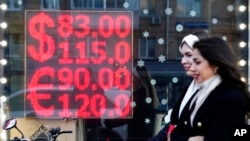The Group of Seven industrialized nations rejected the Kremlin's demand that they pay for natural gas in rubles, the German energy minister said Monday.
"All G-7 ministers have agreed that this is a unilateral and clear breach of existing contracts," said Robert Habeck, German Federal Minister for Economic Affairs and Climate Action, after G-7 countries and European Union representatives met Friday to come to a unified position.
"Payment in ruble is not acceptable, and we will urge the companies affected not to follow (Russian President Vladimir) Putin's demand," Habeck said.
"Putin's demand to convert the contracts to ruble (means) he is standing with his back to the wall in that regard. Otherwise, he wouldn't have made that demand," Habeck added, noting that Russia needs rubles to help finance war expenses.
Putin declared that Russia will order "unfriendly" countries to pay in rubles only for natural gas. The demand for the central banks to work out a procedure for buyers to acquire rubles in Russia could inflate the currency even more and lead to a natural gas shutoff, analysts say, which would greatly hurt Russia's economy, along with Europe's.
Europe gets 40% of its gas and 25% of its oil from Russia. Since the beginning of the war, Europe has attempted to organize proposals to decrease its dependency.
Western sanctions have sparked inflation in Russia and hurt its economy. Some officials are doubtful that Russia's demand for ruble payments will be successful.
"Putin's attempt to divide us is obvious," Habeck said. "But as you can see from this great unity and determination, we will not be divided."
When asked if Russia could suspend gas supplies to European consumers if the countries do not pay with rubles, Kremlin spokesman Dmitry Peskov said, "We clearly aren't going to supply gas for free. In our situation, it's hardly possible and feasible to engage in charity for Europe."
Some information for this report came from The Associated Press.





